Odoo Review: Pros, Cons, Pricing
We like Odoo for its effectiveness as a light ERP, offering modularity, simple integration, and ease of use. As companies scale up, they can add modules piecemeal as needed. Odoo offers inventory management functionalities at a lower price point than many cloud-based ERPs.
On the other hand, you’ll need technical expertise or a dedicated support team to deploy the software, integrate third-party apps, or customize the source code to fit your company’s workflows.
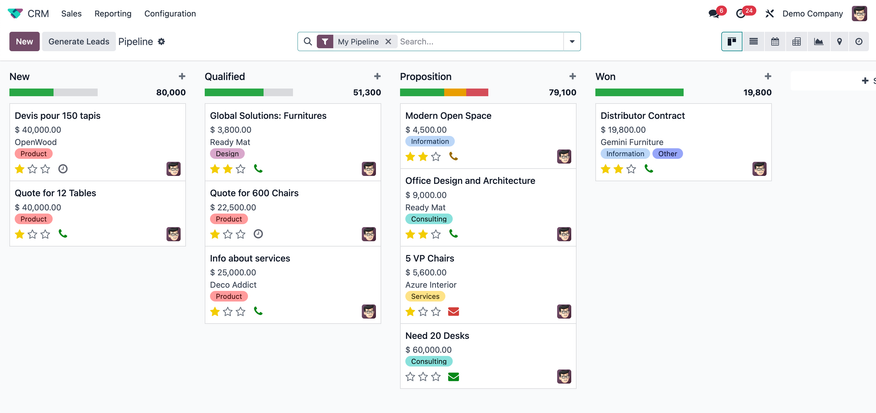
- Community version is free
- Heavy customization options
- Double entry inventory system
- Full suite of business applications
- Traceability reports from customer to supplier
- May have to build specific modules yourself
- No centralized support
- Upgrades not free
- Cluttered mobile app
- Developer Odoo S.A.
- Client OS Web
- Deployment Cloud or On-Premises
What Is Odoo ERP?
Odoo is an open-source ERP software that integrates CRM, manufacturing, eCommerce, and more business apps. Among the Odoo apps, we’ll focus on the accounting module and its core bookkeeping features.
Odoo’s accounting module offers functionality in accounts payables and receivables, bank synchronization, and reporting. You can extend the accounting app’s functionality with the tax report module. Taxes and reports are pre-configured in Odoo based on your fiscal localization package.
Our Ratings
| Usability - 7 | Easy to locate essential functions on the accounting dashboard (invoicing, billing, reconciling transactions); activity log consumes vital workspace and is not collapsible; reconciliation layout would benefit from a side-by-side comparison format. |
| Support - 10 | Provides an emergency phone number, live chat, and an option to submit a support ticket; offers two-factor authentication; features extensive online documentation for developers and end users. |
| Scalability - 7 | Offers core accounting features for small businesses; standard invoicing and billing functionality is great for growing companies; mobile app requires unnecessary scrolling and might complicate on-the-go data entry. |
| Security - 10 | Includes two-factor authentication using a dedicated mobile app like Authy or Google Authenticator; allows configuration of user-access permissions down to specific modules; permits exporting data into xlsx files. |
| Value - 10 | Total cost of ownership is lower than most ERP software; monthly subscription offers unlimited access to all apps for one user. |
| Performance - 7 | Great software speed and performance; final preview for new invoices and bills can sometimes take a while to load; detailed user interface can slow the completion of repetitive tasks. |
| Key Features - 10 | Allows option to enter new bills manually or upload PDF/DOC files; auto-generates printable PDF versions during invoice creation; lets you send invoices by post automatically for the cost of a local stamp; has localization modules for certain countries that pre-load your default taxes into the database. |
Who Uses Odoo ERP?
We recommend Odoo for small companies with one to ten employees and mid-sized businesses with 50 to 200. It’s best for organizations that have outgrown spreadsheets or simple accounting and inventory software. Odoo shines with its modular structure, allowing you to add components as needed. This is a draw for companies looking to pay only for what they use, especially as they scale up.
Odoo Makes Invoicing Simple
Generating an invoice in Odoo is relatively simple, though we found the form layout counterintuitive. Here’s how to create an invoice in Odoo:
- Click the New Invoice button on the Accounting dashboard.
- Enter your customer’s name, invoice date, payment reference number, etc.
- Add product information, including quantity, price, and taxes.
- Click the Confirm button to approve the invoice.
- Select Send & Print and Save when you are satisfied with the preview.
Odoo will prompt you to download and email the invoice. We like that you can send the invoice automatically by post for the cost of a local stamp.
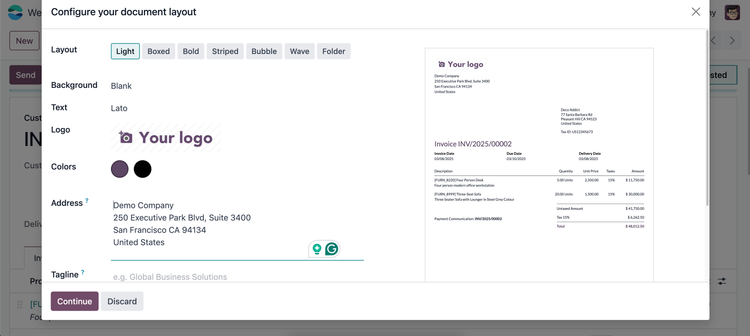
Invoicing in the Odoo App
Generating a new invoice on the Odoo app follows the same process. We found the process a little harder to navigate on a mobile device.
- Start on the Accounting Dashboard and click the New Invoice button.
- Enter your customer’s name, invoice date, payment reference number, etc.
- Fill out your invoice date, payment reference number, and payment terms.
- Add product information, including quantity, price, tax, etc.
- Click the Save & Close button to exit the product details screen.
- Scroll up to find the Confirm button in the upper right-hand corner.
- Select the Send & Print button to preview your invoice.
- Click Save when you’re satisfied with the invoice preview.
Odoo will navigate you to a final screen where you will again click Send & Print This triggers an email sent to your customer’s email and allows you to download a print version of the invoice to your device.
Adding Odoo Vendor Bills
We found uploading your vendor bill directly to Odoo fast and efficient: Go to the Accounting Dashboard. Click the Upload button on the Vendor Bills card. Select the document from your internal files and click Open to upload.
Odoo parses the bill, auto-fills the relevant fields, and then drops it into your drafts. We were impressed with the quick process, and Odoo accurately reflected the data presented in the original document.
If you manually add a vendor bill, it follows the same process as invoicing:
- Click the Create Manually link under the Upload button.
- Enter your vendor’s name, bill due dates, recipient bank, etc.
- Add product information, including quantity, price, tax, etc. Click Confirm.
- Select Register Payment to enter Journal, Payment Method, and Payment Date details.
- Click the Create Payment button to post the bill.
Odoo Bank Reconciliation
Odoo allows you to check if your balance in Odoo synchronizes with your bank details. We found the layout confusing, as line items are not presented in a direct one-on-one comparison. However, we could search by vendor name and transaction amounts when there was no clear match for a transaction.
The process looks like this:
- Click Reconcile X Items on the Accounting dashboard under Bank.
- Odoo opens two panels: bank statement lines on the left, Odoo transactions on the right.
- Click the Validate button to confirm that items match.
- Click the To Check button to mark items with no obvious match for investigation.
You can also create different reconciliation models to tell Odoo when it’s okay to auto-validate transactions. For example, under “Configuration,” you can create a rule to auto-validate any transactions where invoices and bills have a perfect match.
What Features Are Missing?
Odoo is an excellent ERP pick for businesses of any size, particularly those in the manufacturing sector. However, there are a few key elements that your team should address before jumping in:
- Simple Maintenance: Businesses moving to Odoo should devise a clear implementation plan and have the technical expertise on hand to deploy the software, integrate third-party apps, or customize the source code to fit your company’s workflows.
- Free Plan Viability: Odoo’s free plan is limited to one app, plus any secondary apps it depends on to function correctly. While it is promoted as a “free” option, in actuality, through the course of normal use, you’ll 99% of the time require the paid version.
Odoo Pricing
| Plan | Pricing | Features |
| One App | Free |
|
| Standard | $31.10/user/month (annual billing) $38.90/user/month (monthly billing) |
|
| Custom | $46.70/user/month (annual billing) $58.40/user/month (monthly billing) |
|
Odoo offers first-year savings and further discounts with annual subscriptions:
- The standard monthly rate is $31.10 per user. An annual subscription reduces this to $24.90 per user per month.
- New customers receive a promotional rate: $24.90 per user per month for the first year with an annual plan, then $31.10.
- For monthly plans, the promotional rate is $31.10 for the first year, then $38.90.
What is the difference between Odoo Community vs. Enterprise?
Odoo offers two editions of its software: Community and Enterprise. Odoo Community is available as an open-source version. It’s free to download, use, and modify. You can access Community without any licensing fees.
Enterprise is the commercial version of the software. It’s a paid subscription with regular updates, additional support, and features catering to specific industry needs, such as advanced inventory.
What are the different types of hosting in Odoo?
-
Odoo Online is a software-as-a-service platform with automatic technical support, daily database backups, and upgrades. This hosting type limits your third-party apps and source alterations.
-
The second type is On-Premises, which allows unlimited customization with apps and source code alterations. However, you’ll need advanced technical knowledge to do this.
-
Odoo.sh is a hybrid option that manages hosting but still allows you to customize source code. Odoo.sh also provides some tooling to help manage version upgrades and testing. It guarantees 99.9% uptime and includes daily backups.
Is Odoo accounting really free?
Odoo accounting is free if you do not upgrade to a second app. The One App Free plan allows unlimited users to access one free app in a cloud-hosted database on Odoo Online. However, you will incur a monthly fee once you deploy additional modules in project management, time tracking, HR, CRM, etc.
Do big companies use Odoo software?
Larger companies use Odoo because it’s an open-source enterprise resource planning (ERP) software designed to handle an organization’s complex, interconnected processes. Because anyone can access its source code, Odoo is highly customizable to meet the specific business needs of companies like DelMonte Philippines, Sodexo/Idealis Consulting, and Toyota Material Handling.
Which industries use Odoo?
The use of Odoo as an ERP solution is widespread in various industries. The top sectors include manufacturing, education, energy, healthcare, hospitality, and retail. Odoo’s open-source architecture means organizations can tailor the software’s code to align with unique organizational workflows. Furthermore, Odoo offers operational-specific applications so businesses can add what they need as they scale up.
Odoo vs. Zoho: How Do They Compare?
Odoo is a light ERP with a modular design, so you can integrate various functions into one platform. Zoho is a suite of 45 cloud-based apps; while they work together, they also operate independently for businesses that may not require a full ERP system.
Being open-source, Odoo provides extensive customization. You can modify or extend functionalities through modules or tweak the source code. Zoho provides customization options, but they’re generally more standardized and confined to automating workflows and adjusting settings.
Odoo provides a free Community edition and a paid Enterprise edition with per-user pricing. Zoho offers flexible plans, including Zoho One’s per-employee pricing for full suite access or individual app subscriptions.
Alternatives
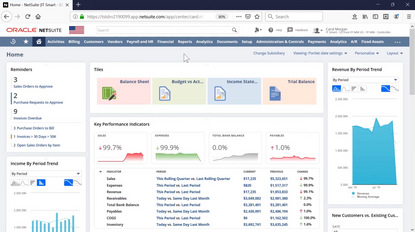
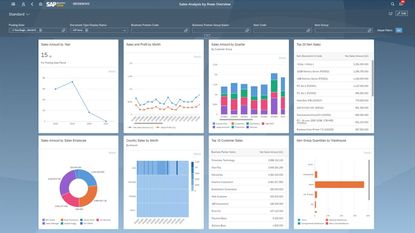
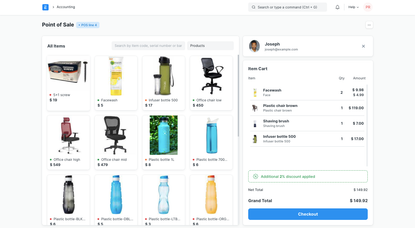
Summary
We recommend using Odoo if you’re looking for a customizable ERP solution that grows with your company and meets your specific business requirements. This platform integrates easily with third-party and Odoo apps from point-of-sale to warehouse management, so adding modules as needed is not an issue.
Regarding Odoo’s accounting app, you can easily track sales and expenses, generate invoices and vendor bills, and synchronize your bank account for accurate reconciliation. However, companies should prepare to invest resources for implementation and ongoing maintenance, either through their internal IT team or consultants.
That said, Odoo provides extensive documentation for developers and end users. Its accounting module supports multi-company and -currency systems, giving it an edge over other applications with similar functionality and pricing.
User Reviews of Odoo
Write a ReviewOdoo Review
bad application
Pros
not for beginner friendly
Cons
bad application
- Distribution
- 1-10 employees
- Annual revenue $1M-$10M
Super powerful tool!
I was very impressed with what the software can do. I would give it a 5! The other platforms I looked into you had to buy extra modules for them to be added to the software, but with Odoo everything can be added manually, which I enjoy!
Pros
Ease-of-use Features
- Textiles and apparel
- 51-250 employees
- Annual revenue $1M-$10M
Perfect for our needs!
We reviewed many different software programs, but Odoo really fulfilled all of our needs and has many modules that are beneficial throughout all of our departments.
Pros
Functionality Modules
- Distribution: Durable goods
- 1-10 employees
- Annual revenue $0-$1M
Not customizable enough for my company
It was an alright software, but it wasn’t able to fully work with the complexity in which I needed to break my product down into specific tile and stone distribution (colored names not matching with colored styles).
- 11-50 employees
- Annual revenue $10M-$50M
Very cost-effective
Out of all the software I looked at, this one was the most cost-effective for my company.
Pros
Price
- Manufacturing
- 11-50 employees
Good overall
Good product overall. Does what we need. The majority of my negativity comes from the accounting side. We are still using QBs for accounting because of this, but other than that everything else works good.
Pros
Functionality
Cons
Accounting
I appreciate the modular structure
it has a free version ( limited to the number of modules) which you can try ( and use if it fits your needs) and then subscribe to enterprise to use all the modules
also, the modules can be changed via the studio app and if that doesn’t help, you can make your module.
e-commerce is connected to another module which makes life much easier and require less manpower to do the job and it’s very easy to design your store the way you like without coding which is a big plus.
Pros
Odoo stands out as an exceptional business management solution due to its comprehensive suite of applications that cover everything from CRM and sales to inventory, accounting, and HR. The platform's user-friendly interface makes it accessible to users of varying technical backgrounds, and its open-source nature allows for extensive customization. I appreciate the modular structure, which enables businesses to tailor their Odoo instance to their specific needs. The active community support, regular updates, and seamless integration capabilities further enhance the overall experience. In summary, Odoo is a versatile and scalable solution that streamlines business processes and fosters efficiency.
Cons
Implementing and customizing Odoo may require a learning curve, particularly for users who are not familiar with ERP systems. The abundance of features and configuration options can be overwhelming for new users.
The flexibility is impressive
We went with Odoo for its user experience and the overall usability of the tool. It’s basically very intuitive. The different modules which are used for research and development are as well. We like the versioning and routings, which is one very important task for our company. The flexibility is impressive.
- Consumer Staples
- 11-50 employees
- Annual revenue $1M-$10M
Customizeable and easy to use
We were looking for a new WMS system and ended up finding a re-seller of Odoo that does both ERP and WMS integrations. They have a pretty customizeable software that lets us have the modules we need without the extra stuff we dont.
I also really liked how easy and straight forward their system was. We have some not so tech savvy guys and they would easly be able to pick up learning this system.
They also were one of the lowest cost to implement systems so we ended up leaning towards Odoo for our new system.
Pros
Customizeable and easy to use
- Food Products
- 1-10 employees
- Annual revenue $1M-$10M
Affordable with a nice interface
In our search for an ERP, we reviewed the major players (Netsuite, Dynamics) and though the systems could meet our needs as a food distirbutor, their pricing was prohibitive. After receiving our recommendations through Software Connect we narrowed it down, focused on Odoo, mainly because of the affordability of the program. We also had a team majority that liked the interface better.
- Metals & Mining
- 251-1K employees
They let us use one module for free
Hasn’t cost me anything yet. They let us use one module for free, until we go to upgrade and I did the inventory module and they gave me inventory AND manufacturing. So right now that doesn’t cost anything. I’ve only used those modules but will be upgrading soon. Support has been pretty good so far.
- 11-50 employees
- Annual revenue $1M-$10M
Odoo's modular architecture was the reason we moved forward
The search for an ERP began because of expansive growth in the company. After looking at and comparing several programs, Odoo’s modular architecture was the reason we moved forward with them. They offer 100 different apps that you can add on but if needed can start with just one. You pick what you need you at that time. Their pricing was also much more affordable than the other options we looked at.
Great features and modules when done right
The software is relative easy to use. But you must work with a team that understands different aspects like accounting, cost analysis, information technology, etc. You must do this in order to get the best result from a software that offers this many modules.
Pros
Easy of use and incredible amount of modules available. Good technical support from Odoo in the enterprise version. In the open source version a vast community that can answer your question. Plus Odoo group everywhere from Facebook to Reddit.
Cons
To get a complete picture and use of Odoo, a steep learning curve waits, because of the many option that it offers. A good solution is to take a team approach to it's implementation.
Odoo Review
The software was able to adapt and meet the companies needs as they continued to change. The software worked perfect at connecting with their Magento eCommerce website.
Odoo Review
It was important to find a solution that encompassed ERP, CRM and HR. Odoo fulfilled that need with a customized Odoo suite.
Odoo Review
All goals were met with the Odoo software with ease and efficiency.
Odoo Review
Needed to integrate the 3PL with Odoo. Now we can follow order management and the inventory dashboard easier than ever.
Odoo Review
Having Odoo on the backend instantly took us to the next level. We upgraded because we wanted a higher quality system with more features and enhancements
Odoo Review
With such a bottomless resource of business applications and modules, the possibilities of customization that coincide with Odoo are quite literally endless.
Odoo Review
We now have all business processes centralized and are able to access information. This allows us to accurately analyze the information to make more-informed business decisions.
You will never get your money back so quit asking
Odoo look great and performs terribly. And to add insult to injury the company is incredibly dishonest. It is almost impossible to import and export data without one of Odoo’s techs. And . . . you get to pay $250+ per hour just to import and export vital information. Odoo insists that you just need their “onboarding package”. Don’t do it! The first hour and a half is spent running through a powerpoint presentation telling you that you don’t know what you need, but of course they do. Then, weeks later, when they can’t deliver what they promised, they tell you that if you just pay more, they’ll be able to make it work the way they promised in the beginning. A lot of companies have been scammed by this company and then feel stuck because they’ve spent thousands of dollars implementing it. We cut our losses and moved on to a more honest company.
Pros
The cards and list feature is very handy.
Cons
The company is dishonest and it is almost impossible to make it work correctly without spending THOUSANDS of dollars. When we asked for our money back after 3 months of absolutely nothing working correctly, I was told, "You will never get your money back so quit asking."
- Internet Software & Services
- 11-50 employees
- Annual revenue $1M-$10M
Odoo is the present and future of ERP Software
Odoo is more than a ERP, it is a complete suite of business apps for modern companies. It support all business process in just one application, with more than 250 modules and support for small, medium and big companies. Odoo is the present and future of ERP Software. When you start using it, you will love Odoo, as I do.
Pros
Capacity for integration and price flexibility.
Cons
Localization for some countries.
- Communications Equipment
- 11-50 employees
- Annual revenue $1M-$10M
Odoo Review
The costs for this system do not represent a value, we have had the worst experience.
- Semiconductors & Semiconductor Equipment
- 1-10 employees
- Annual revenue $0-$1M
It's a good full ERP program with marketing and sales features
It’s a good full ERP program with marketing and sales features. However, as a manufacturer, it didn’t have the detailed parts tracking and reporting we need. It’s also difficult to import/export because it doesn’t tell what format to import/export in and results in an error message. The training is also a separate price so that is a minus.
- Life Sciences Tools & Services
- 11-50 employees
- Annual revenue $1M-$10M
One of the best ERPs for SMEs and startups alike
Awesome ERP concept, extreme integration, superb usability. Its clearly one of the best ERPs on the market today for SMEs and startups alike.
Pros
Usability, it is just Fun to use (and you are doing business using it...)
Cons
It does have some Bugs and sometimes your process does not fit to the standard. On the SaaS offer this means customization, as the Odoo Appstore is not available on this hosted Version. Also the localizations are still missing out a lot. We are based in Switzerland and had to implement a lot of the "Swiss Finish" ourselves.
If Apple were to design an ERP, Odoo would be it
As a former Netsuite customer, we had the bar set very high in terms of functionality and flexibility. What we weren’t expecting is the usability to be simple. This software package is so complete it usurps even Netsuite in terms of flexibility and is so easy to use that getting new users on the system and productive is just a matter of a few hours and in some cases, not even that. If Apple were to design an ERP, Odoo would be it. Mobile app gives you almost complete usage available as well.
Pros
By far we like the usability best, so easy to use, new users are using the system effectively on Day One.
Cons
The ability to change colors of the back end scheme requires customization or the purchase of a 3rd party module
Odoo comes with tons of features that are fully customizable
Odoo comes with tons of features that are fully customizable but best of all it is internet ready and no dependent on client configuration.
Pros
It's very easy to set up and also completely modular. the community behind is also here to provide very usefull tips.
Cons
Some features are officially covered but when you look into details you often realise it is necessary to build specific modules.
